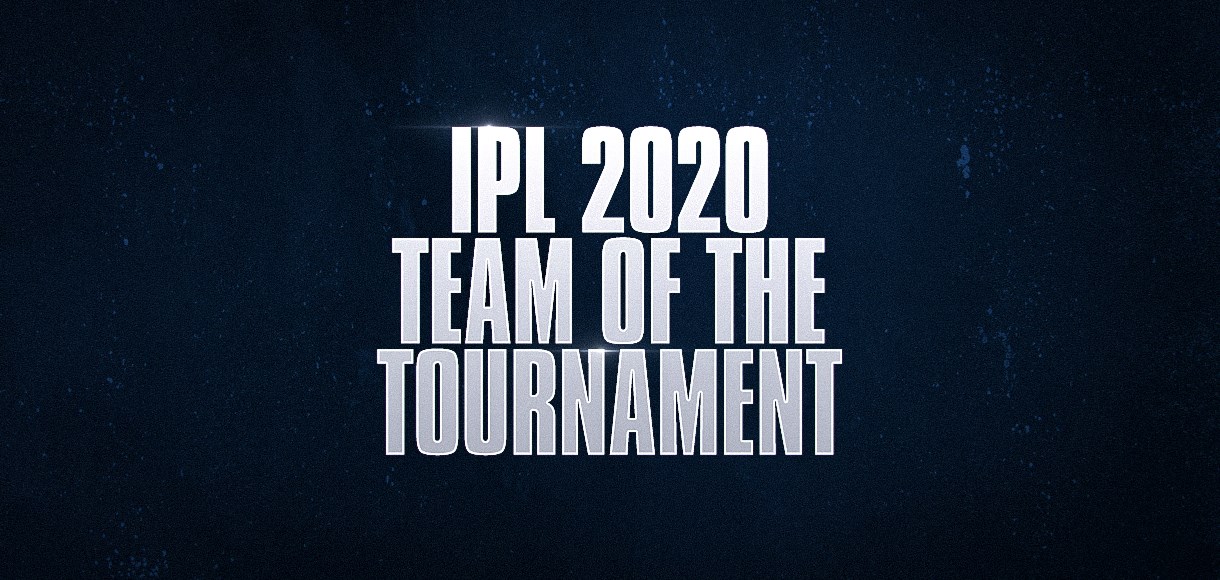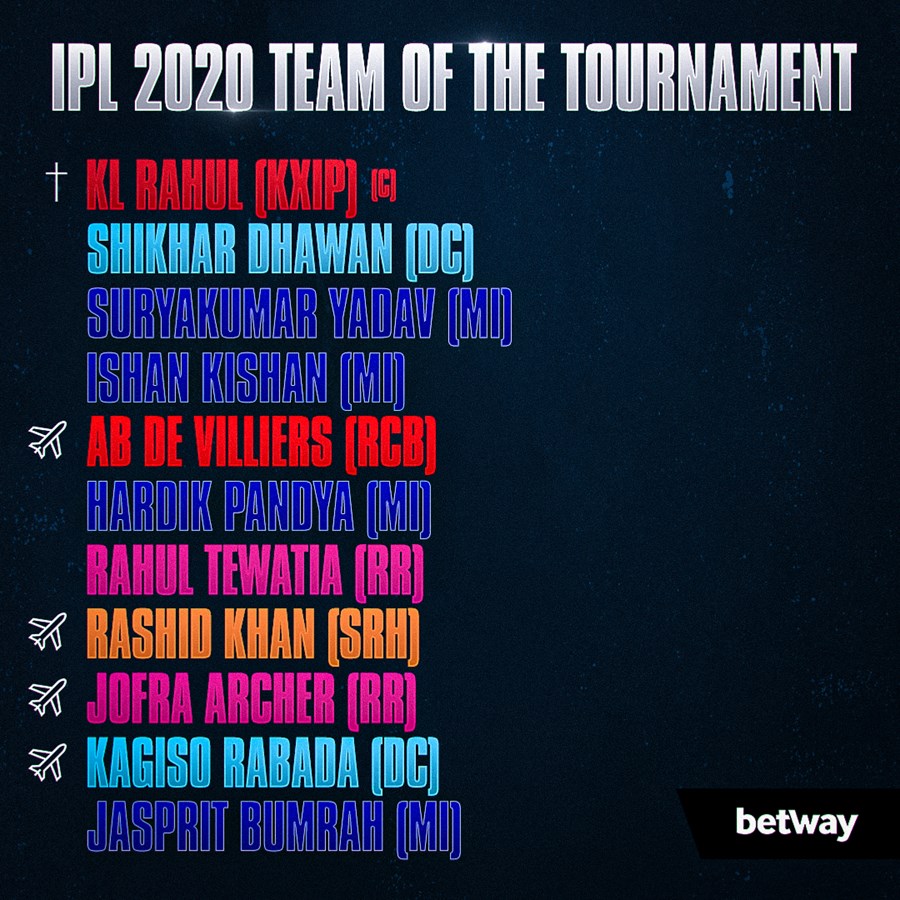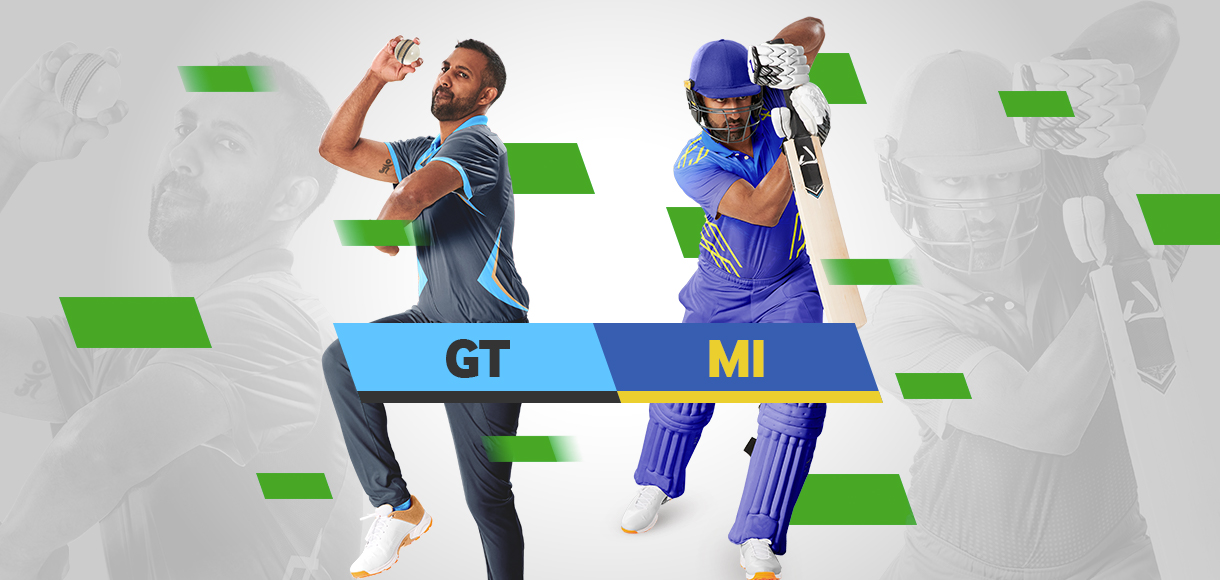IPL 2020: Team of the Tournament

With the 13th edition of the Indian Premier League now in the books, who makes our team of the tournament?
KL Rahul † (c) (Kings XI Punjab) - 670 runs
Rahul had to be part of this team, purely on weight of runs.
The Kings XI Punjab captain ends the tournament with the Orange Cap after compiling 670 runs in just 14 matches at an average in excess of 55.
His unbeaten 132 against the Royal Challengers, coming off just 69 balls, put him into the history books with the highest score by an Indian player and highest score by a captain in the IPL.
Shikhar Dhawan (Delhi Capitals) - 618 runs
Dhawan was Rahul’s closest challenger for the Orange Cap, falling short in the final but ending the tournament comfortably clear of anyone else.
The India international suffered some inconsistency throughout the competition, including four ducks, but put together some big scores to muscle Delhi into the final.
The highlight of Dhawan’s tournament was back-to-back centuries against the Super Kings and Kings XI – the first time any batsman has achieved that feat in IPL history.
Suryakumar Yadav (Mumbai Indians) - 480 runs
Suryakumar goes under the radar in a Mumbai side full of big names, but his contribution to their success cannot be overlooked.
This is the third straight season in which he has scored more than 400 runs, while he also registered the highest score and best average in his IPL career.
Most importantly, though, his runs came at crucial times, with a match-winning 79* against Bangalore particularly impressive.
Ishan Kishan (Mumbai Indians) - 516 runs
Where Suryakumar relied on his experience to impress this year, Kishan relied on his youthful exuberance.
The 22-year-old, long touted as an exciting talent, delivered on that promise with 516 runs at an average of 57.33.
Of those runs, 180 came from a tournament-high 30 sixes, with Kishan’s explosive batting taking the game away from several of Mumbai’s opponents.
AB de Villiers (Royal Challengers Bangalore) - 454 runs
De Villiers must be getting frustrated with the lack of success at RCB.
As he always does, the South African legend delivered for Bangalore, scoring 454 runs at 45.40 – including five half-centuries – with his strike rate almost touching 160.
His heroics could not drag the Royal Challengers to their first title, although he does get the consolation of making our team of the tournament.
Hardik Pandya (Mumbai Indians) - 281 runs
Pandya has moonlighted as a specialist middle-order destroyer for Mumbai this year, with recent back surgery meaning his bowling talents have taken a backseat.
It was a highly successful transition from all-rounder to batsman for the India international, who plundered 281 runs in 13 innings.
At certain times during the tournament it felt like every ball faced by Pandya was clearing the ropes, with his destructive hitting carrying Mumbai to several massive totals.

Rahul Tewatia (Rajasthan Royals) - 255 runs and 10 wickets
Cricket data analyst Dan Weston picked out Tewatia as a player to watch for the 2019 IPL, but it took one more year for him to truly break through.
The 27-year-old’s steady leg spin – 10 wickets and an economy rate of 7.08, the 15th-best in the competition – was in stark contrast to his explosive efforts with the bat.
Though he only made an impact in a handful of games, his innings against Rajasthan Royals early on in the competition, when he turned eight off 19 deliveries into 53 off 31 to help his side chase down 223, will live long in the memory.
Rashid Khan (Sunrisers Hyderabad) - 20 wickets
Rashid was already having a good tournament when he delivered figures of 3-7 from four overs against Delhi Capitals at the end of October, the best of the tournament and arguably the most impressive in the competition’s history.
The Afghanistan talisman is now an experienced T20 bowler, but batsmen still have little clue how to deal with his mystery leg spin. He ends the competition with the best economy rate of anybody who turned their arm over.
He is well on the way to IPL legendary status.
Jofra Archer (Rajasthan Royals) - 20 wickets
By the end of the IPL, it was a surprise if Archer hadn’t put Rajasthan Royals in a promising position after his opening spell.
The 25-year-old took 10 Powerplay wickets at an economy rate of 4.34 – largely as a result of his rapid, intimidating short bowling, that had opening batsmen jumping out of their skin. He would tend to return for more at the death, and he is now undoubtedly established as a worldwide star.
Unfortunately for him, it became customary for Rajasthan to relinquish the advantage he gave them, but that this was such a one-man show made his efforts all the more impressive.
Kagiso Rabada (Delhi Capitals) - 30 wickets
Rabada set the tone for his IPL by taking seven wickets in Delhi Capital’s first three matches, quickly establishing himself at the top of the overall wicket-taker standings.
Largely operating at the death, he has been happy to share the load with compatriot Anrich Nortje as the tournament has progressed, but his consistency has seen him finish eight wickets clear of Nortje to make certain that he was Delhi’s MVP.
His tally of 30 wickets was enough to see him leave the UAE with the Purple Cap, denoting his status as the leading wicket-taker in the competition.
Jasprit Bumrah (Mumbai Indians) - 27 wickets
It seems a long time ago that Bumrah made a quiet start to the IPL, taking five wickets in his first four outings.
He has been extraordinary since, with a tally of 22 wickets in his next 11 including two 4-fers and three 3-fers.
The numbers don’t do justice to Bumrah’s wizardry, though. That his short run-up and rapid arm speed can deliver, in particular, such deadly yorkers, clearly mark him out as the most skilled pace bowler in T20 cricket.
Visit Betway's cricket betting page.





































